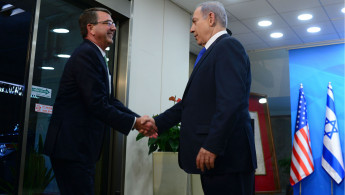US defence chief meets Netanyahu following rising US-Iran tensions
US Defence Secretary Ashton Carter met Israeli prime minister Binyamin Netanyahu on Tuesday, amid rising tensions between the US and Iran.
No comments were made about the US and Iran's recent war of words, but the Israeli PM has been a vehment opponent of the US-led nuclear deal with Iran.
He has also urged lawmakers in Washington to reject the accord.
Carter is on the first leg of a regional tour, and due to meet officials from Saudi Arabia who are also suspicious about the nuclear deal.
US Secretary of State John Kerry raised the alarm about recent anti-US remarks made by Iran's supreme leader during an interview with al-Arabiya news channel.
Ayatollah Ali Khamanei told a packed mosque on Saturday that US policies are Iranian policies in the region were "180 degrees" opposed, and that its strategy towards the "arrogant" US would not change.
Reuters said that after the speech finished the audience broke out into chants of "death to America".
During the TV interview, Kerry said he found the remarks "very troubling" and "very disturbing".
Deal or no deal
Tehran has been at loggerheads with the US and its Arab allies in recent years, after Iran's continued support for Syrian leader Bashar al-Assad, as well as its backing of Shia militias in Iraq and the Houthi movement in Yemen.
It was hoped that a recent US-led nuclear deal with Iran would lead to a detente between the two countries following decades of tensions.
Washington severed diplomatic ties with Tehran in 1980, after a group of Iranian students occupied the US embassy in the country.
Yesterday, the UN security council unanimously approved a nuclear deal that was brokered last week by the five permanent members of the council, plus Germany, and Iran.
The vote means that UN sanctions on Iran will be lifted.
Moments after the vote, Iran's ambassador to the UN lashed out at the US. This was followed by a critical response from Washington's envoy.
Iran is split between conservatives - who support the ayatollah - and moderates who surround reformist president Hassan Rouhani.
It was Rouhani's team of largely US-educated diplomats who helped strike the nuclear deal with Washington.
The prospect of decades' long sanctions being lifted was met by an outpouring of popular celebrations, something that might have worried conservatives.
Khamanei warned Iranians to be cautious about the deal.
Hardliners might be wary of a repeat of the 2009 Green Movement, which saw liberals and students hold mass protests across Iran against suspected malpractices during that year's election.
The movement was brutally supressed by Iranian security forces, and the conservatives continue to hold important posts in government.





 Follow the Middle East's top stories in English at The New Arab on Google News
Follow the Middle East's top stories in English at The New Arab on Google News
![Netanyahu furiously denounced the ICC [Getty]](/sites/default/files/styles/image_330x185/public/2024-11/GettyImages-2169352575.jpg?h=199d8c1f&itok=-vRiruf5)
![Both Hamas and the Palestinian Authority welcomed the ICC arrest warrants [Getty]](/sites/default/files/styles/image_330x185/public/2024-11/GettyImages-2178351173.jpg?h=199d8c1f&itok=TV858iVg)
